Reflection on Caring Experience and Nursing Literature (NUR1100)
VerifiedAdded on 2022/09/18
|8
|1862
|47
Essay
AI Summary
This essay provides a comprehensive reflection on the student's personal experiences with caring, particularly focusing on the care provided to their grandmother during a period of illness. The essay then transitions to demonstrate the student's understanding of professional nursing caring, drawing upon key concepts from the NUR1100 course. It integrates Jean Watson's Caring Theory, person-centered care principles, evidence-based practice, and the NMBA standards of practice for Registered Nurses. The student illustrates how these theoretical frameworks and practical guidelines influence their approach to patient care and how they intend to apply this knowledge in their future practice as a registered nurse. The essay also includes a discussion on communication skills, infection control strategies, and the importance of providing oxygen to COPD patients based on evidence-based practices. The student concludes by reiterating the importance of integrating personal experiences, theoretical knowledge, and professional standards to deliver high-quality nursing care.
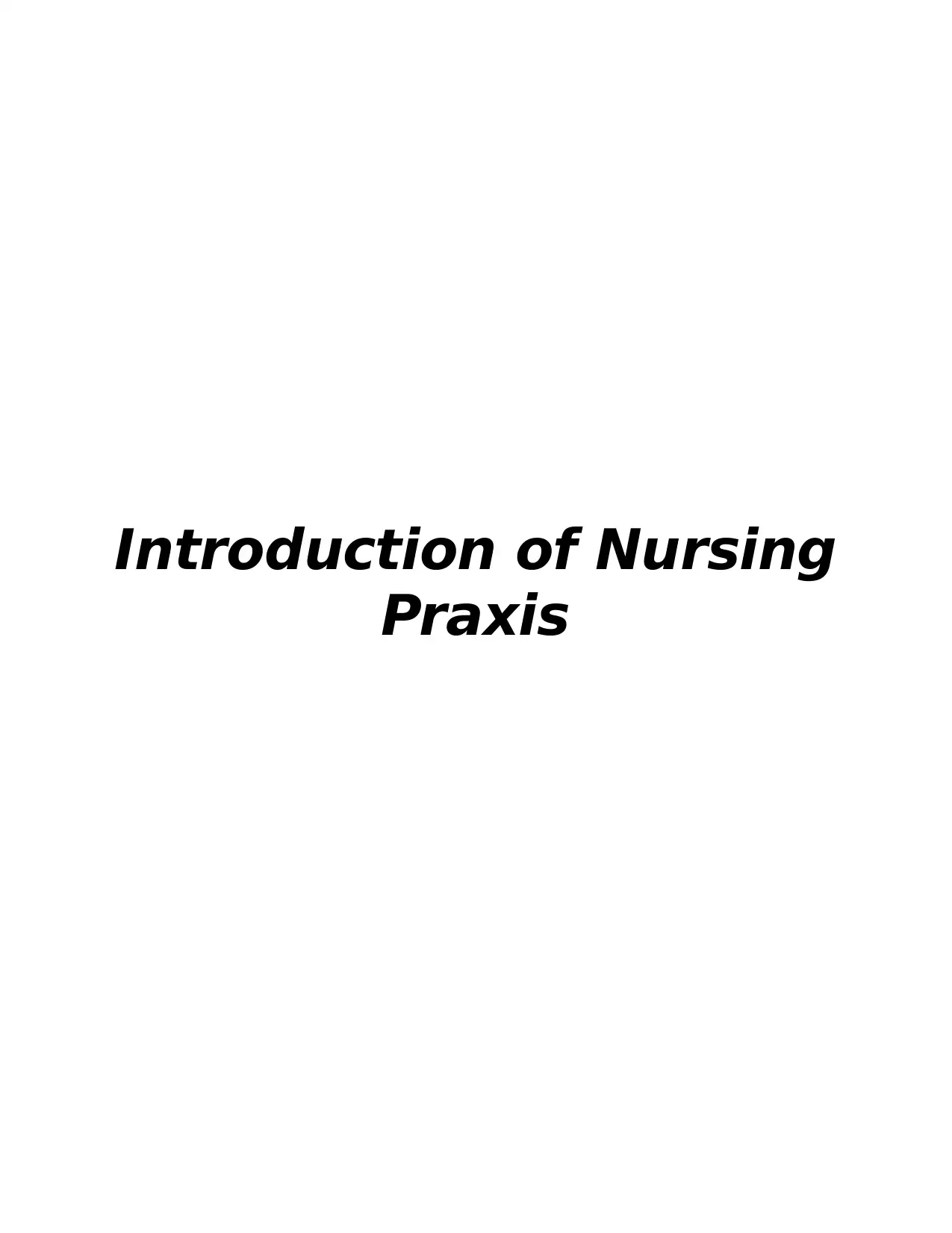
Introduction of Nursing
Praxis
Praxis
Paraphrase This Document
Need a fresh take? Get an instant paraphrase of this document with our AI Paraphraser
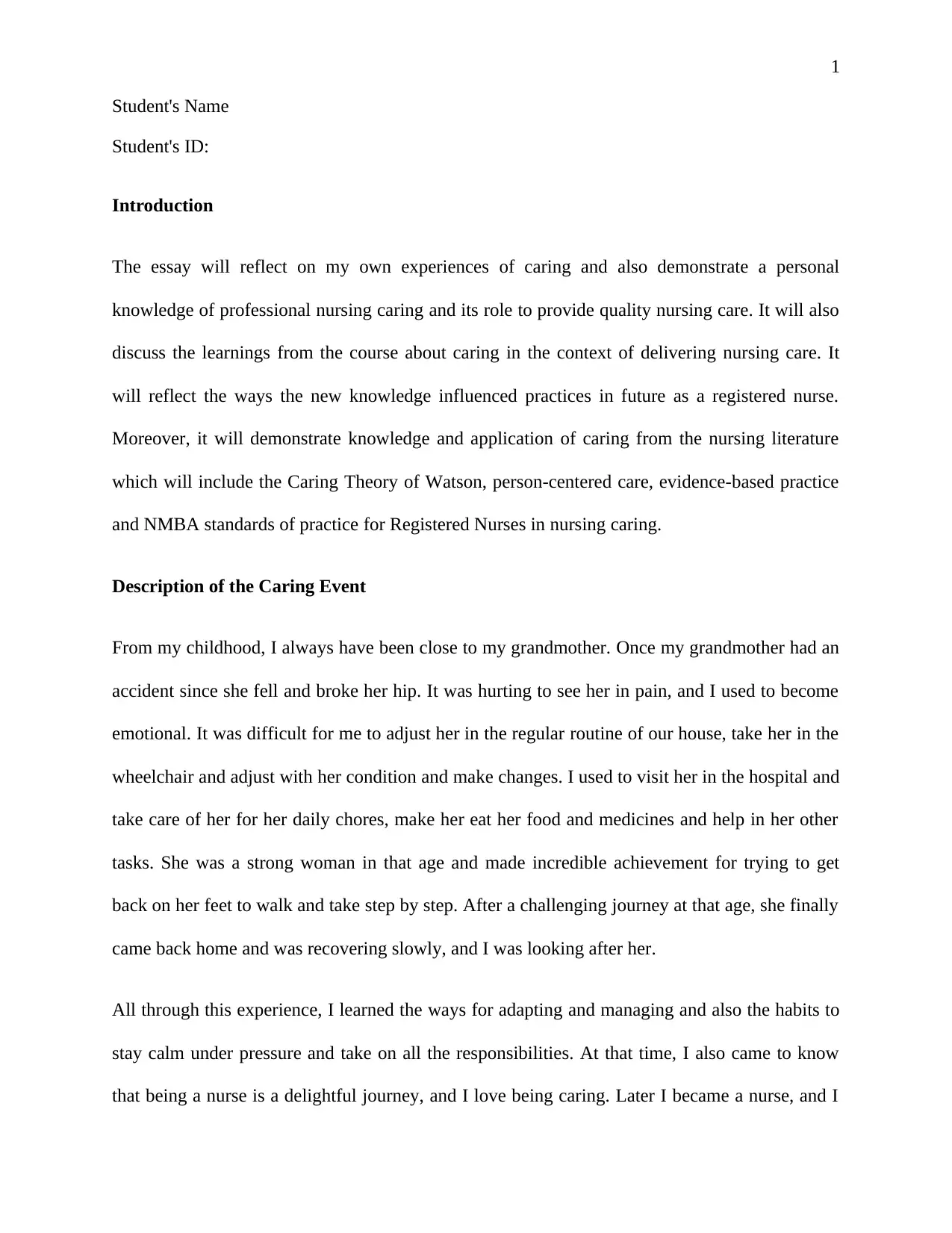
1
Student's Name
Student's ID:
Introduction
The essay will reflect on my own experiences of caring and also demonstrate a personal
knowledge of professional nursing caring and its role to provide quality nursing care. It will also
discuss the learnings from the course about caring in the context of delivering nursing care. It
will reflect the ways the new knowledge influenced practices in future as a registered nurse.
Moreover, it will demonstrate knowledge and application of caring from the nursing literature
which will include the Caring Theory of Watson, person-centered care, evidence-based practice
and NMBA standards of practice for Registered Nurses in nursing caring.
Description of the Caring Event
From my childhood, I always have been close to my grandmother. Once my grandmother had an
accident since she fell and broke her hip. It was hurting to see her in pain, and I used to become
emotional. It was difficult for me to adjust her in the regular routine of our house, take her in the
wheelchair and adjust with her condition and make changes. I used to visit her in the hospital and
take care of her for her daily chores, make her eat her food and medicines and help in her other
tasks. She was a strong woman in that age and made incredible achievement for trying to get
back on her feet to walk and take step by step. After a challenging journey at that age, she finally
came back home and was recovering slowly, and I was looking after her.
All through this experience, I learned the ways for adapting and managing and also the habits to
stay calm under pressure and take on all the responsibilities. At that time, I also came to know
that being a nurse is a delightful journey, and I love being caring. Later I became a nurse, and I
Student's Name
Student's ID:
Introduction
The essay will reflect on my own experiences of caring and also demonstrate a personal
knowledge of professional nursing caring and its role to provide quality nursing care. It will also
discuss the learnings from the course about caring in the context of delivering nursing care. It
will reflect the ways the new knowledge influenced practices in future as a registered nurse.
Moreover, it will demonstrate knowledge and application of caring from the nursing literature
which will include the Caring Theory of Watson, person-centered care, evidence-based practice
and NMBA standards of practice for Registered Nurses in nursing caring.
Description of the Caring Event
From my childhood, I always have been close to my grandmother. Once my grandmother had an
accident since she fell and broke her hip. It was hurting to see her in pain, and I used to become
emotional. It was difficult for me to adjust her in the regular routine of our house, take her in the
wheelchair and adjust with her condition and make changes. I used to visit her in the hospital and
take care of her for her daily chores, make her eat her food and medicines and help in her other
tasks. She was a strong woman in that age and made incredible achievement for trying to get
back on her feet to walk and take step by step. After a challenging journey at that age, she finally
came back home and was recovering slowly, and I was looking after her.
All through this experience, I learned the ways for adapting and managing and also the habits to
stay calm under pressure and take on all the responsibilities. At that time, I also came to know
that being a nurse is a delightful journey, and I love being caring. Later I became a nurse, and I
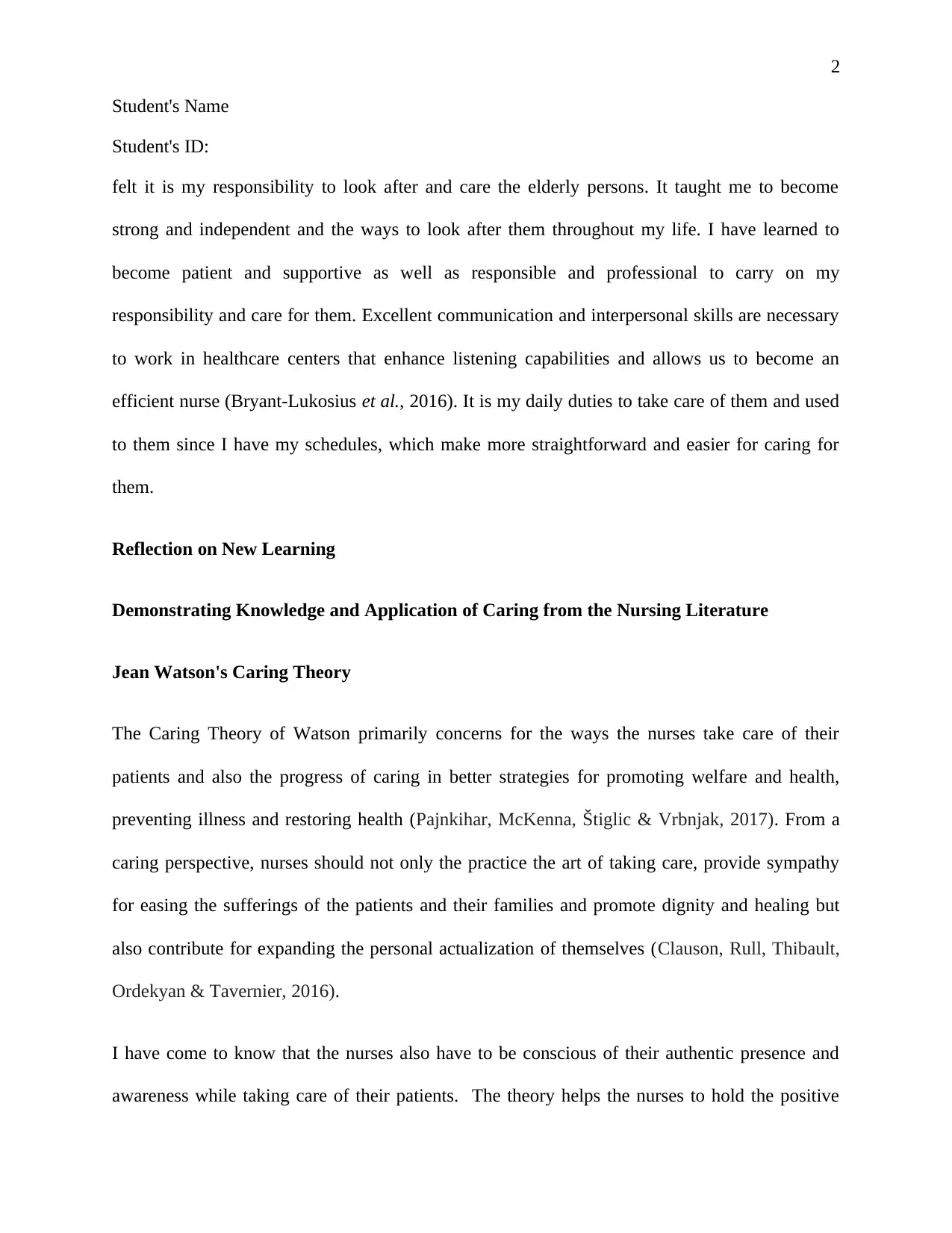
2
Student's Name
Student's ID:
felt it is my responsibility to look after and care the elderly persons. It taught me to become
strong and independent and the ways to look after them throughout my life. I have learned to
become patient and supportive as well as responsible and professional to carry on my
responsibility and care for them. Excellent communication and interpersonal skills are necessary
to work in healthcare centers that enhance listening capabilities and allows us to become an
efficient nurse (Bryant‐Lukosius et al., 2016). It is my daily duties to take care of them and used
to them since I have my schedules, which make more straightforward and easier for caring for
them.
Reflection on New Learning
Demonstrating Knowledge and Application of Caring from the Nursing Literature
Jean Watson's Caring Theory
The Caring Theory of Watson primarily concerns for the ways the nurses take care of their
patients and also the progress of caring in better strategies for promoting welfare and health,
preventing illness and restoring health (Pajnkihar, McKenna, Štiglic & Vrbnjak, 2017). From a
caring perspective, nurses should not only the practice the art of taking care, provide sympathy
for easing the sufferings of the patients and their families and promote dignity and healing but
also contribute for expanding the personal actualization of themselves (Clauson, Rull, Thibault,
Ordekyan & Tavernier, 2016).
I have come to know that the nurses also have to be conscious of their authentic presence and
awareness while taking care of their patients. The theory helps the nurses to hold the positive
Student's Name
Student's ID:
felt it is my responsibility to look after and care the elderly persons. It taught me to become
strong and independent and the ways to look after them throughout my life. I have learned to
become patient and supportive as well as responsible and professional to carry on my
responsibility and care for them. Excellent communication and interpersonal skills are necessary
to work in healthcare centers that enhance listening capabilities and allows us to become an
efficient nurse (Bryant‐Lukosius et al., 2016). It is my daily duties to take care of them and used
to them since I have my schedules, which make more straightforward and easier for caring for
them.
Reflection on New Learning
Demonstrating Knowledge and Application of Caring from the Nursing Literature
Jean Watson's Caring Theory
The Caring Theory of Watson primarily concerns for the ways the nurses take care of their
patients and also the progress of caring in better strategies for promoting welfare and health,
preventing illness and restoring health (Pajnkihar, McKenna, Štiglic & Vrbnjak, 2017). From a
caring perspective, nurses should not only the practice the art of taking care, provide sympathy
for easing the sufferings of the patients and their families and promote dignity and healing but
also contribute for expanding the personal actualization of themselves (Clauson, Rull, Thibault,
Ordekyan & Tavernier, 2016).
I have come to know that the nurses also have to be conscious of their authentic presence and
awareness while taking care of their patients. The theory helps the nurses to hold the positive
⊘ This is a preview!⊘
Do you want full access?
Subscribe today to unlock all pages.

Trusted by 1+ million students worldwide
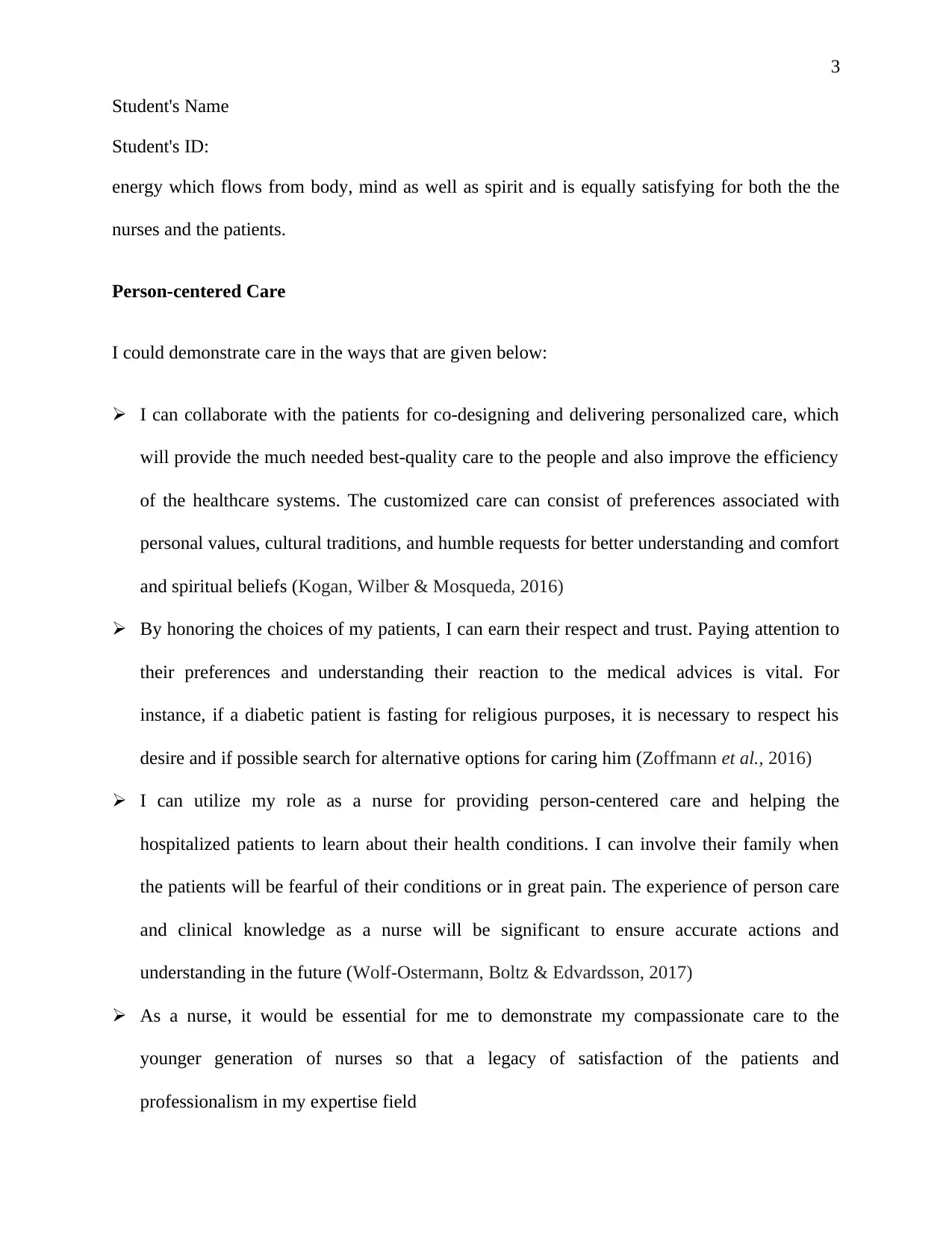
3
Student's Name
Student's ID:
energy which flows from body, mind as well as spirit and is equally satisfying for both the the
nurses and the patients.
Person-centered Care
I could demonstrate care in the ways that are given below:
I can collaborate with the patients for co‐designing and delivering personalized care, which
will provide the much needed best‐quality care to the people and also improve the efficiency
of the healthcare systems. The customized care can consist of preferences associated with
personal values, cultural traditions, and humble requests for better understanding and comfort
and spiritual beliefs (Kogan, Wilber & Mosqueda, 2016)
By honoring the choices of my patients, I can earn their respect and trust. Paying attention to
their preferences and understanding their reaction to the medical advices is vital. For
instance, if a diabetic patient is fasting for religious purposes, it is necessary to respect his
desire and if possible search for alternative options for caring him (Zoffmann et al., 2016)
I can utilize my role as a nurse for providing person-centered care and helping the
hospitalized patients to learn about their health conditions. I can involve their family when
the patients will be fearful of their conditions or in great pain. The experience of person care
and clinical knowledge as a nurse will be significant to ensure accurate actions and
understanding in the future (Wolf-Ostermann, Boltz & Edvardsson, 2017)
As a nurse, it would be essential for me to demonstrate my compassionate care to the
younger generation of nurses so that a legacy of satisfaction of the patients and
professionalism in my expertise field
Student's Name
Student's ID:
energy which flows from body, mind as well as spirit and is equally satisfying for both the the
nurses and the patients.
Person-centered Care
I could demonstrate care in the ways that are given below:
I can collaborate with the patients for co‐designing and delivering personalized care, which
will provide the much needed best‐quality care to the people and also improve the efficiency
of the healthcare systems. The customized care can consist of preferences associated with
personal values, cultural traditions, and humble requests for better understanding and comfort
and spiritual beliefs (Kogan, Wilber & Mosqueda, 2016)
By honoring the choices of my patients, I can earn their respect and trust. Paying attention to
their preferences and understanding their reaction to the medical advices is vital. For
instance, if a diabetic patient is fasting for religious purposes, it is necessary to respect his
desire and if possible search for alternative options for caring him (Zoffmann et al., 2016)
I can utilize my role as a nurse for providing person-centered care and helping the
hospitalized patients to learn about their health conditions. I can involve their family when
the patients will be fearful of their conditions or in great pain. The experience of person care
and clinical knowledge as a nurse will be significant to ensure accurate actions and
understanding in the future (Wolf-Ostermann, Boltz & Edvardsson, 2017)
As a nurse, it would be essential for me to demonstrate my compassionate care to the
younger generation of nurses so that a legacy of satisfaction of the patients and
professionalism in my expertise field
Paraphrase This Document
Need a fresh take? Get an instant paraphrase of this document with our AI Paraphraser
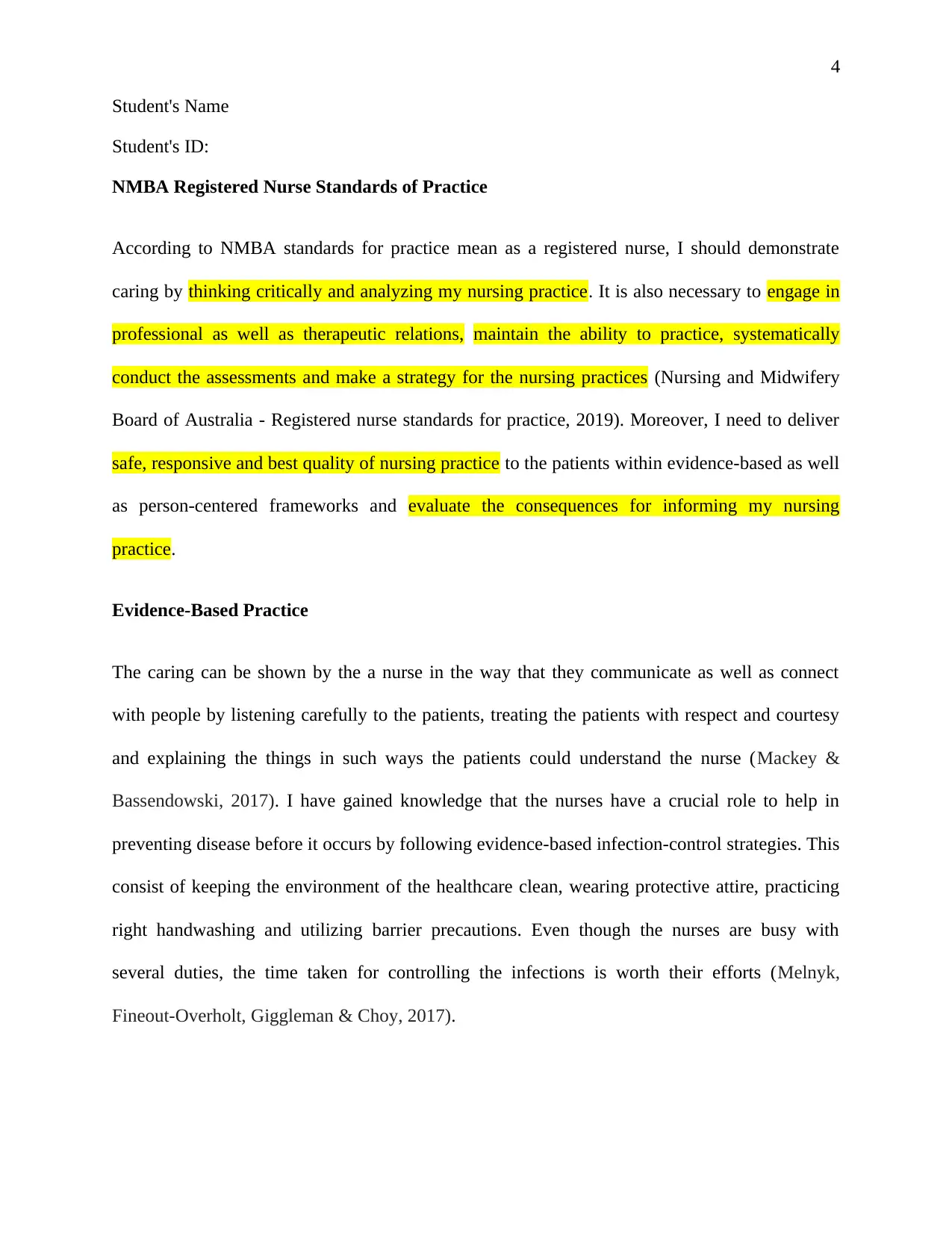
4
Student's Name
Student's ID:
NMBA Registered Nurse Standards of Practice
According to NMBA standards for practice mean as a registered nurse, I should demonstrate
caring by thinking critically and analyzing my nursing practice. It is also necessary to engage in
professional as well as therapeutic relations, maintain the ability to practice, systematically
conduct the assessments and make a strategy for the nursing practices (Nursing and Midwifery
Board of Australia - Registered nurse standards for practice, 2019). Moreover, I need to deliver
safe, responsive and best quality of nursing practice to the patients within evidence-based as well
as person-centered frameworks and evaluate the consequences for informing my nursing
practice.
Evidence-Based Practice
The caring can be shown by the a nurse in the way that they communicate as well as connect
with people by listening carefully to the patients, treating the patients with respect and courtesy
and explaining the things in such ways the patients could understand the nurse (Mackey &
Bassendowski, 2017). I have gained knowledge that the nurses have a crucial role to help in
preventing disease before it occurs by following evidence-based infection-control strategies. This
consist of keeping the environment of the healthcare clean, wearing protective attire, practicing
right handwashing and utilizing barrier precautions. Even though the nurses are busy with
several duties, the time taken for controlling the infections is worth their efforts (Melnyk,
Fineout‐Overholt, Giggleman & Choy, 2017).
Student's Name
Student's ID:
NMBA Registered Nurse Standards of Practice
According to NMBA standards for practice mean as a registered nurse, I should demonstrate
caring by thinking critically and analyzing my nursing practice. It is also necessary to engage in
professional as well as therapeutic relations, maintain the ability to practice, systematically
conduct the assessments and make a strategy for the nursing practices (Nursing and Midwifery
Board of Australia - Registered nurse standards for practice, 2019). Moreover, I need to deliver
safe, responsive and best quality of nursing practice to the patients within evidence-based as well
as person-centered frameworks and evaluate the consequences for informing my nursing
practice.
Evidence-Based Practice
The caring can be shown by the a nurse in the way that they communicate as well as connect
with people by listening carefully to the patients, treating the patients with respect and courtesy
and explaining the things in such ways the patients could understand the nurse (Mackey &
Bassendowski, 2017). I have gained knowledge that the nurses have a crucial role to help in
preventing disease before it occurs by following evidence-based infection-control strategies. This
consist of keeping the environment of the healthcare clean, wearing protective attire, practicing
right handwashing and utilizing barrier precautions. Even though the nurses are busy with
several duties, the time taken for controlling the infections is worth their efforts (Melnyk,
Fineout‐Overholt, Giggleman & Choy, 2017).
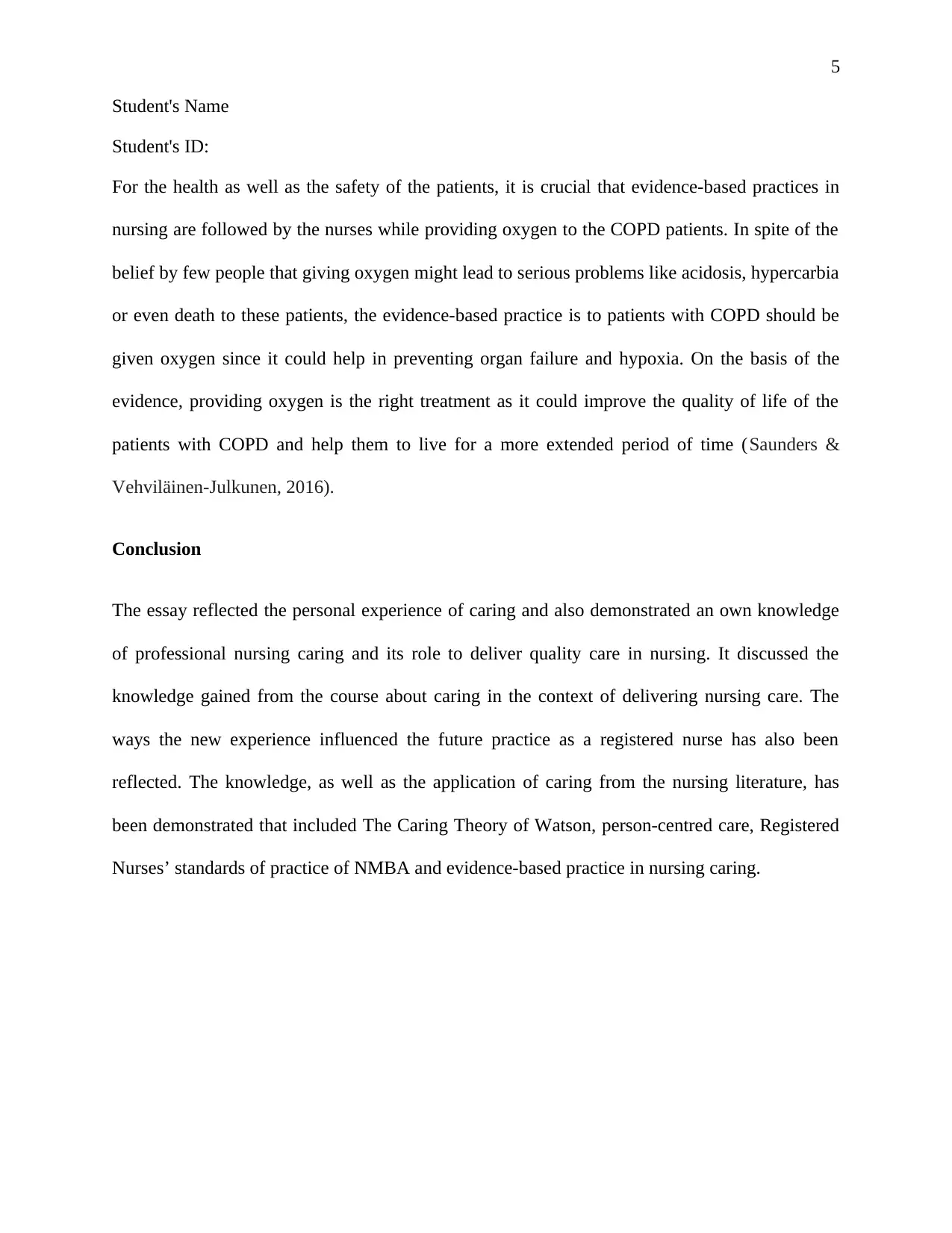
5
Student's Name
Student's ID:
For the health as well as the safety of the patients, it is crucial that evidence-based practices in
nursing are followed by the nurses while providing oxygen to the COPD patients. In spite of the
belief by few people that giving oxygen might lead to serious problems like acidosis, hypercarbia
or even death to these patients, the evidence-based practice is to patients with COPD should be
given oxygen since it could help in preventing organ failure and hypoxia. On the basis of the
evidence, providing oxygen is the right treatment as it could improve the quality of life of the
patients with COPD and help them to live for a more extended period of time (Saunders &
Vehviläinen-Julkunen, 2016).
Conclusion
The essay reflected the personal experience of caring and also demonstrated an own knowledge
of professional nursing caring and its role to deliver quality care in nursing. It discussed the
knowledge gained from the course about caring in the context of delivering nursing care. The
ways the new experience influenced the future practice as a registered nurse has also been
reflected. The knowledge, as well as the application of caring from the nursing literature, has
been demonstrated that included The Caring Theory of Watson, person-centred care, Registered
Nurses’ standards of practice of NMBA and evidence-based practice in nursing caring.
Student's Name
Student's ID:
For the health as well as the safety of the patients, it is crucial that evidence-based practices in
nursing are followed by the nurses while providing oxygen to the COPD patients. In spite of the
belief by few people that giving oxygen might lead to serious problems like acidosis, hypercarbia
or even death to these patients, the evidence-based practice is to patients with COPD should be
given oxygen since it could help in preventing organ failure and hypoxia. On the basis of the
evidence, providing oxygen is the right treatment as it could improve the quality of life of the
patients with COPD and help them to live for a more extended period of time (Saunders &
Vehviläinen-Julkunen, 2016).
Conclusion
The essay reflected the personal experience of caring and also demonstrated an own knowledge
of professional nursing caring and its role to deliver quality care in nursing. It discussed the
knowledge gained from the course about caring in the context of delivering nursing care. The
ways the new experience influenced the future practice as a registered nurse has also been
reflected. The knowledge, as well as the application of caring from the nursing literature, has
been demonstrated that included The Caring Theory of Watson, person-centred care, Registered
Nurses’ standards of practice of NMBA and evidence-based practice in nursing caring.
⊘ This is a preview!⊘
Do you want full access?
Subscribe today to unlock all pages.

Trusted by 1+ million students worldwide
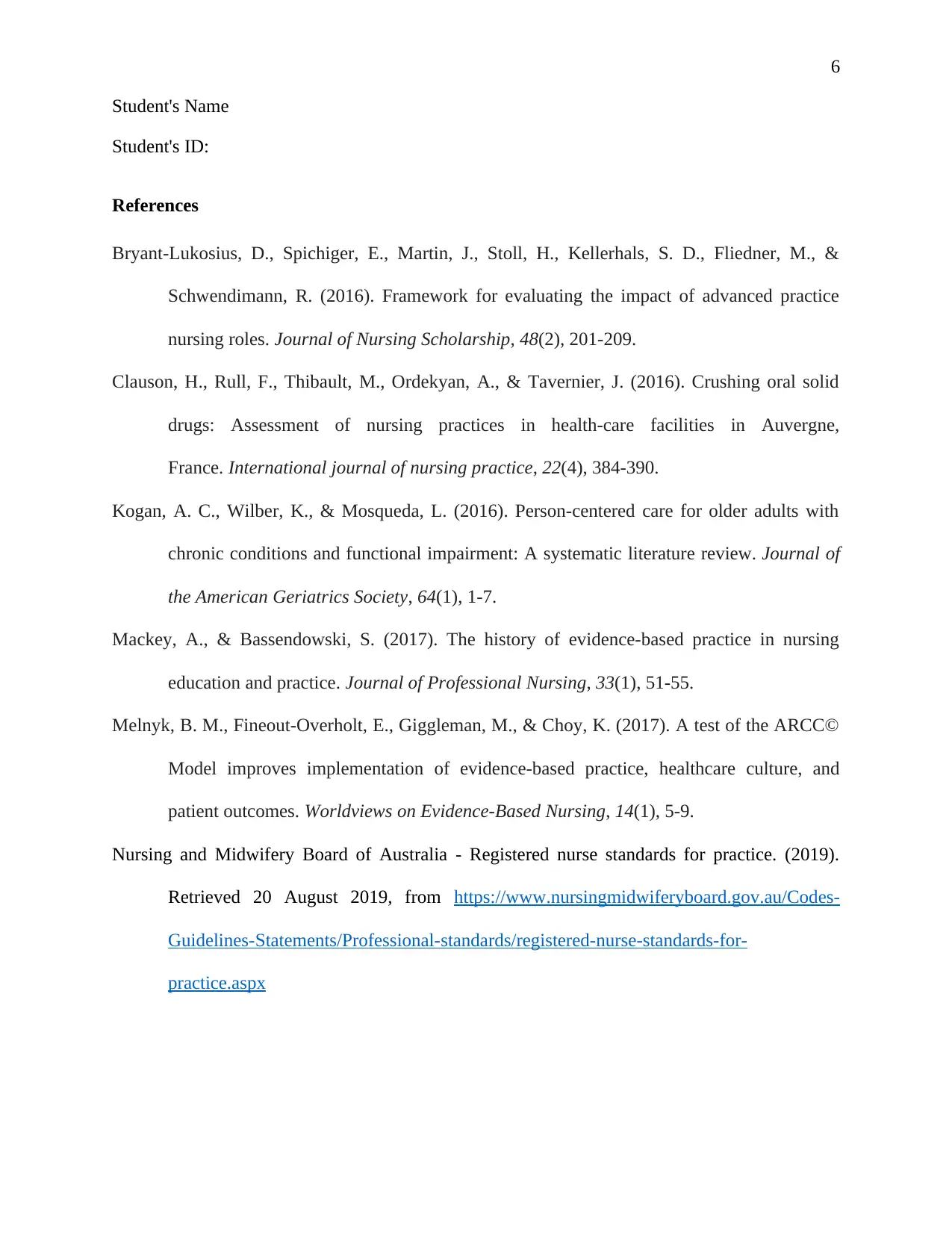
6
Student's Name
Student's ID:
References
Bryant‐Lukosius, D., Spichiger, E., Martin, J., Stoll, H., Kellerhals, S. D., Fliedner, M., &
Schwendimann, R. (2016). Framework for evaluating the impact of advanced practice
nursing roles. Journal of Nursing Scholarship, 48(2), 201-209.
Clauson, H., Rull, F., Thibault, M., Ordekyan, A., & Tavernier, J. (2016). Crushing oral solid
drugs: Assessment of nursing practices in health‐care facilities in Auvergne,
France. International journal of nursing practice, 22(4), 384-390.
Kogan, A. C., Wilber, K., & Mosqueda, L. (2016). Person‐centered care for older adults with
chronic conditions and functional impairment: A systematic literature review. Journal of
the American Geriatrics Society, 64(1), 1-7.
Mackey, A., & Bassendowski, S. (2017). The history of evidence-based practice in nursing
education and practice. Journal of Professional Nursing, 33(1), 51-55.
Melnyk, B. M., Fineout‐Overholt, E., Giggleman, M., & Choy, K. (2017). A test of the ARCC©
Model improves implementation of evidence‐based practice, healthcare culture, and
patient outcomes. Worldviews on Evidence‐Based Nursing, 14(1), 5-9.
Nursing and Midwifery Board of Australia - Registered nurse standards for practice. (2019).
Retrieved 20 August 2019, from https://www.nursingmidwiferyboard.gov.au/Codes-
Guidelines-Statements/Professional-standards/registered-nurse-standards-for-
practice.aspx
Student's Name
Student's ID:
References
Bryant‐Lukosius, D., Spichiger, E., Martin, J., Stoll, H., Kellerhals, S. D., Fliedner, M., &
Schwendimann, R. (2016). Framework for evaluating the impact of advanced practice
nursing roles. Journal of Nursing Scholarship, 48(2), 201-209.
Clauson, H., Rull, F., Thibault, M., Ordekyan, A., & Tavernier, J. (2016). Crushing oral solid
drugs: Assessment of nursing practices in health‐care facilities in Auvergne,
France. International journal of nursing practice, 22(4), 384-390.
Kogan, A. C., Wilber, K., & Mosqueda, L. (2016). Person‐centered care for older adults with
chronic conditions and functional impairment: A systematic literature review. Journal of
the American Geriatrics Society, 64(1), 1-7.
Mackey, A., & Bassendowski, S. (2017). The history of evidence-based practice in nursing
education and practice. Journal of Professional Nursing, 33(1), 51-55.
Melnyk, B. M., Fineout‐Overholt, E., Giggleman, M., & Choy, K. (2017). A test of the ARCC©
Model improves implementation of evidence‐based practice, healthcare culture, and
patient outcomes. Worldviews on Evidence‐Based Nursing, 14(1), 5-9.
Nursing and Midwifery Board of Australia - Registered nurse standards for practice. (2019).
Retrieved 20 August 2019, from https://www.nursingmidwiferyboard.gov.au/Codes-
Guidelines-Statements/Professional-standards/registered-nurse-standards-for-
practice.aspx
Paraphrase This Document
Need a fresh take? Get an instant paraphrase of this document with our AI Paraphraser
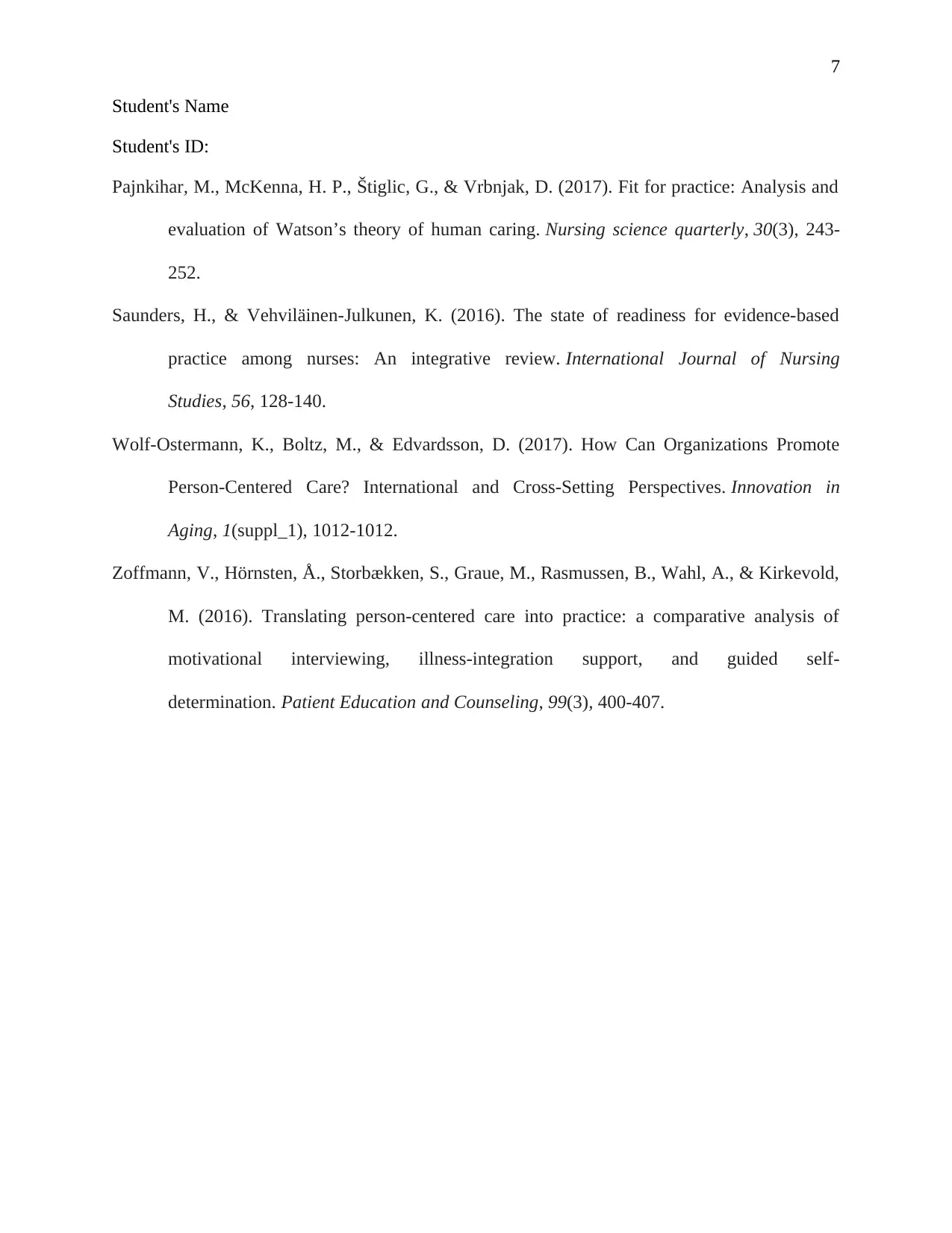
7
Student's Name
Student's ID:
Pajnkihar, M., McKenna, H. P., Štiglic, G., & Vrbnjak, D. (2017). Fit for practice: Analysis and
evaluation of Watson’s theory of human caring. Nursing science quarterly, 30(3), 243-
252.
Saunders, H., & Vehviläinen-Julkunen, K. (2016). The state of readiness for evidence-based
practice among nurses: An integrative review. International Journal of Nursing
Studies, 56, 128-140.
Wolf-Ostermann, K., Boltz, M., & Edvardsson, D. (2017). How Can Organizations Promote
Person-Centered Care? International and Cross-Setting Perspectives. Innovation in
Aging, 1(suppl_1), 1012-1012.
Zoffmann, V., Hörnsten, Å., Storbækken, S., Graue, M., Rasmussen, B., Wahl, A., & Kirkevold,
M. (2016). Translating person-centered care into practice: a comparative analysis of
motivational interviewing, illness-integration support, and guided self-
determination. Patient Education and Counseling, 99(3), 400-407.
Student's Name
Student's ID:
Pajnkihar, M., McKenna, H. P., Štiglic, G., & Vrbnjak, D. (2017). Fit for practice: Analysis and
evaluation of Watson’s theory of human caring. Nursing science quarterly, 30(3), 243-
252.
Saunders, H., & Vehviläinen-Julkunen, K. (2016). The state of readiness for evidence-based
practice among nurses: An integrative review. International Journal of Nursing
Studies, 56, 128-140.
Wolf-Ostermann, K., Boltz, M., & Edvardsson, D. (2017). How Can Organizations Promote
Person-Centered Care? International and Cross-Setting Perspectives. Innovation in
Aging, 1(suppl_1), 1012-1012.
Zoffmann, V., Hörnsten, Å., Storbækken, S., Graue, M., Rasmussen, B., Wahl, A., & Kirkevold,
M. (2016). Translating person-centered care into practice: a comparative analysis of
motivational interviewing, illness-integration support, and guided self-
determination. Patient Education and Counseling, 99(3), 400-407.
1 out of 8
Related Documents
Your All-in-One AI-Powered Toolkit for Academic Success.
+13062052269
info@desklib.com
Available 24*7 on WhatsApp / Email
![[object Object]](/_next/static/media/star-bottom.7253800d.svg)
Unlock your academic potential
Copyright © 2020–2026 A2Z Services. All Rights Reserved. Developed and managed by ZUCOL.





